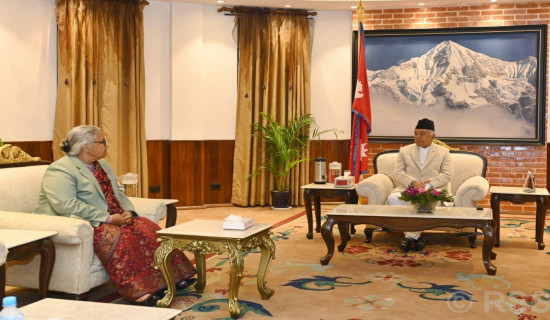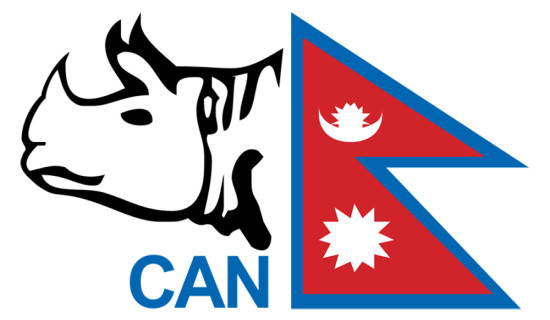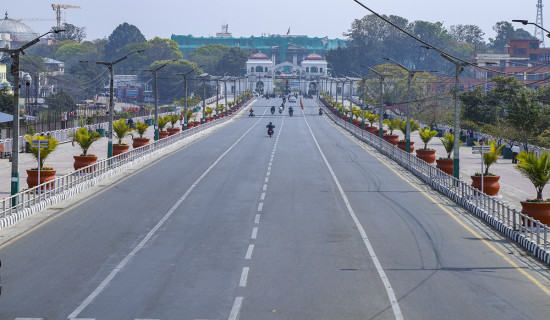- Wednesday, 4 March 2026
Leveraging Nepal's Geostrategic Position
Rationality of any foreign policy requires an understanding of the sensitivity of the nation’s positional advantage, population settlement and mobility, resource endowment, circulation of its goods and management of their links. The geopolitical metaphor of Nepal as a “yam between two boulders,” coined by King Prithvi Narayan Shah, depicts its delicate strategic geography management of which is essential for national survival, stability and progress. Wedged between the giant neighbours' Achilles heels, Nepal derives its strength from this configuration. But the nation senses a certain fear of closed space of landlockedness and thin strategic depth. It is this configuration that sets the centrality of its pivot where many great games were played by big powers outside the rule of law amplifying the security concern of neighbours.
Their strategy to coax Nepal into a strategic frame of a buffer, limit with security accord or soft power penetration lured those who equally find its drift odious not because of its national need but because it drains the links of Nepalis to the sanctity of their nation. Pursuing a viable foreign policy entails a spatial cognition of the nation and proper management of spaces: the heartland, Kathmandu, the vital decision centre, strategic zone nearby and protecting it, buffer region averting external penetration to its core values and interests and securing the frontiers. It is vital to create their reciprocity. Technology and communication can ease this. Nepal as a nation with the frame of Panchsheel often aspires to the self-equalising drive of national sovereignty. It has helped the nation to navigate through all geopolitical labyrinths.
General consensus
The general consensus exists among Nepali leaders on democracy, human rights and market economy. They welcome foreign investment of MNCs, MCCs, and other investors, etc. for productivity rise, digitalisation, power trade and connectivity. But habitual eliciting great powers for the legitimacy of regime change or survival and aid dependency hints their geopolitical homophily with the Anglo-Saxon world. Neo-liberal globalisation has added Nepal in stepping out of its vicinity with opportunities in education, health, jobs, trade, tourism and capital flows. It has built extra-regional links, loyalty and affinity. Nepali leaders view that distant power is not a threat to territorial integrity.
But the neoliberal convergence has destroyed the industrial prospect of the nation, crippled real economy, kept ties with Russia sedative and inspired China to evolve a similar politics of congruency owing to its growing investment in Nepal’s development and security concern. The nation’s economic policies have stoked a livelihood and job crises emaciating its centripetal forces. By virtue of developing cooperation with neighbours and great powers on sustainable progress, Nepal can restore its credible roles in world politics. Its role as paterfamilias, a head with big family links all those Nepalis spread out the world over enriching its soft power of Nepali language, identity, spiritualism and culture and emotionally link with them like an eternal bond and bridge.
Youths of Nepali origins participate in music, poem, dance and culture competition while senior people and sages visit temples, monasteries and cultural sites of Hindus and Buddhists in Nepal and relish spiritual fulfilment. Lumbini, the birth place of Buddha, hosts monasteries from many nations. Any visit to the places of origin re-links them with the ancestors. The existence of eight of the world's ten highest peaks attract mountaineers, tourists and scientists while it is also a water tower for South Asia for harnessing progress and managing part of earth’s thermostat. Nepali Diasporas and workers are other links of the nation’s economic lifeblood. They also serve as diplomatic interlocutors.
Nepali leadership’s ability to learn how rugged geography and gallant ancestors fought for national independence can help adapt to the power shift in Asia from the imperial and colonial times to the modern state system. The ascent of neighbours in the power pyramid and influential roles in the global power balance is pivoting the West to Asian politics. China’s shift from a concentric security system to global initiatives on security, development and civilization may inspire India to compete with its multi-directional policies.
In the planetary concept of development owing to interconnection of survival strategies, India is also shedding the effects of its colonial past and seeking to decolonize self and defining its own intellectual, strategic, spiritual and economic order with multi-alignment so that no powerful nation can influence its ability to exercise foreign policy autonomy. The “organic unity” of coalition rule as claimed by Indian Prime Minister Narendra Modi now gives continuity of its pragmatic policies, uncomforting to China, Russia, the EU and the USA.
Nepali leaders and scholars cannot afford the luxury of remaining apathetic to this change in the nation’s vital circumstances and remain lenient to habit-driven mode of feeling no exigency of adjusting its conduct. The economic imperative of building connectivity requires it to diversify ties without contradicting its strategic, cultural and demographic values and recognising the growing Sino-Indian trade interdependence, economic cooperation, sharing of common international regimes and self-determination in values despite border tension.
This condition demands Nepal to play as a link nation, not only remain lenient to a colonially consigned strategic buffer with limited choice or a neutral transit state without the life and culture of its own lebensraum. For a relatively small state like Nepal, adoption of any new foreign policy concept requires sober study about the context and burden, benefit and outcome in pursuing it.
The frame of a transit bridge articulated for extracting economic surplus requires opening of the border with proper regulation. There is a link between the art of exercising economic freedom to the rest of the world and opening of polity and policies and laws to one way. At a time when geo-economics is fused with geopolitics, Nepal needs to look to multiple poles of power. Recently it is pursuing open-ended visa-free policy with China, like India, just to recover from its growing trade deficits now – where imports are disproportionately higher than exports. Trade balance can be achieved through active industrial, trade creating and diversification policies.
Its excessive imports springs from the neoliberal legacy when ruling elites slashed agricultural subsidy, privatized and denationalised most of its import-substituting industries and converted the welfare into a subsidiary state where the workers and peasants have to subsidise the capital. A neo-liberal harmony among elites existed against the state and people spawning unjust outcomes. The realist paradigm requires a national interest approach, not denationalisation. Nepal’s foreign policy elites’ socialisation, acculturation, social linkages and stake in the liberal order, not rooted into the nation’s realpolitik, would less create political will and capacity for properly balancing its links across the nations of all political spectrums.
Mutually beneficial cooperation entails crafting shared interest, not seeking ideological compatibility and the trap of reducing foreign policy to bizarre concepts. Ideology devoid of contextual policy does not make Nepal comfortable to escape from geopolitical determinism and find common ground for cooperation with others. Sovereign initiative needs to spur contextual awareness of leaders about the utility of foreign policy and develop consensus beyond rhetoric to engage in building the strategic choice of breaking the shortcomings of landlockedness and economic backwardness through connectivity, internal market integration and productivity of national political economy of scale for security, foreign and trade policies.
The value addition to an entrepot trade helps spur benefits from the Sino-Indian cooperation and improve global credibility. But it requires settling its quiet diplomacy on the correct track, improving passport’s ranking, releasing Nepalis from Hamas control, repatriating Nepalis from the Russian and Ukraine armies, removing ban of its air fight to EU’s sky and making its Pokhara and Bhairahawa international air ports operational. Building trust with neighbours is a key to humanize borders and revitalise SAARC through quiet diplomacy.
The regional links cannot be limited to only commodity exchange and tourists flow. Both require a robust security mechanism. Nepal needs to beef up national capabilities especially at educational, economic, technological, infrastructural and diplomatic levels even to improve the inputs of remittance. First, leadership must have the notion of a holistic view of linkage politics. Free trade and flow of goods requires consistency of interests in other areas. Foreign policy leaders should not forget the suspension of Nepal’s trade bill in the US Senate for a long time owing to its strategic links with human rights. Second, protection of sovereignty in a competitive world requires the synergy of its state, market and civil society in mutually beneficial cooperation complementing them.
Third, Nepal’s membership of many rival regimes links it into mutual duties. Fourth, in the areas lacking competitive spirit, Nepal has to uphold active self-defence of its vital interest. Leverage through acquired power is not enough to maintain internal cohesion and external adaptation. The nation suffers if the leverage vanishes. The regime-oriented foreign policy thus risks polarisation and makes leadership inapt in the long run, the symptoms of which are already beginning to display. Learning from the nation’s history can offer valuable insight for the framing of apt policy choice and serve the link of the Asian Highway and balance the competing pulls of geopolitics.
A correlation exists between sovereignty and trade, not trade-off. But trade is a means to achieve the higher end — national prosperity and sovereignty. To reduce everything to trade is to remain blind to other critical factors of diplomacy. India’s earlier trade blockade and embargo in the wake of promulgation of new constitution were linked to non-trade grievances which had triggered frequent regime changes in Nepal. The nation’s leadership thus should not be swayed by short-term regime interests while remaining unconscious of long-term state interests. The wisdom of statesmanship lies in learning from the nation's history and comparative experience of other small states caught in the security orbit of powerful nations. Foreign policy operates under the laws of historical necessity unless there is vital change in regional and international circumstances.
National initiative
The strategy to reengineer Nepali state into an ideological image of many political parties, NGOs, civil society and soft power solidaristic institutions thinned its muscle. A state is composed of so many living and non-living elements, history created by the settlers’ struggle for space, adjustment, exchange, culture, knowledge and people’s affinity. They are capable of defying external restraints on its freedom. Abandonment of national initiative such as the zone of peace will not make its foreign policy consistent when so many nations have endorsed it. Any deviation from policy attributes adopted by P. N. Shah to retain national independence can easily weaken it.
Proper geostrategic means increases the leverage of the nation. Nepali leaders must know its value and the reason for great powers’ competition in its space for influence through local proxies, restrain their policy of opposing each other through their indulgence in party politics and creation of restricted zones and strategic assets in their vicinity. The constitutional outreach of Nepal is vital to manage the politics of scale and infusion of politics to geopolitics and economy to the global sphere of linkages.
(Former Reader at the Department of Political Science, TU, Dahal writes on political and social issues.)













-original-thumb.jpg)


